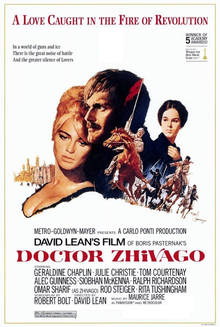DECEMBER 17, 2019 – On Sunday evening I watched David Lean’s Dr. Zhivago. I’ve lost track, but it might have been the 12th time I’ve enjoyed the 1965 epic film directed by David Lean. It went on to become one of the biggest box office hits ever.
For those who read my “thumbs up” review of The Irishman (See 12/08 blog post), you might discount my praise of any film, but at least with Zhivago, the Academy has my back—the movie was nominated for nine Academy Awards and won five. Some of the original reviewers, however, panned it, partly because the film “trivialized” the October Revolution and partly because the script was sparse and action, limited.
As a cultural and historical Russophile, I’ll watch anything featuring Russian music, literature, or history–Alexander Nevsky (1938), directed by Sergei Eisenstein and Dimitri Vasiley, for example, or War and Peace (1956), directed by King Vidor and starring Audrey Hepburn and Henry Fonda. But Zhivago is a special draw.
Maybe it’s the film story, the three big arcs of tension and ultimate resolution—affairs of the heart intertwined with the usual human frailties and short-comings, intermixed with the finest (poetry; charity) and the worst (war; injustice) of humanity, and interwoven with the civilization game-changers of world war and revolution. Or maybe it’s the memorable lines delivered memorably—Viktor Komarovsky (Rod Steiger), telling Zhivago, “There are two kinds of men . . .”; or Zhivago’s half-brother Yevgraf (Alex Guinness), a KGB general, as he observes a long line of mourners at Zhivago’s grave, saying in a voice-over, “No one loves poetry like a Russian.” Or it could be the sweeping scenery of Siberia on the far side of the Urals (actually, the Canadian Rockies). Or the symbolic scenes, such as a character’s face through an icy windowpane or falling petals from a vaseful of sunflowers inside a manor house converted to a wartime army hospital.
More likely, though, it’s the music, “Lara’s Theme.” When I was traveling aboard the Trans-Siberian Train 38 years ago, that music so familiar to Western ears was unknown to Russians—both the film and Pasternak’s book, Dr. Zhivago, had long been banned by the Soviets. A young Swedish woman aboard the train, however, blessed with a beautiful voice, sang the tune repeatedly as a handful of us Western sojourners hung out in a dining car booth. None of the Russians had a clue, so our Swedish friend sang with impunity as our train cut across the frozen Siberian landscape.
I shall always remember that scenery—inside the train, as well as outside—accompanied by the strains of “Lara’s Theme” from Dr. Zhivago.
The Swede was from Umeå in northern Sweden. Two months later I found myself in a pub in Bath, England, chatting with a couple of other Swedes from . . . Umeå. When I told them the story of “Lara’s Theme” sung by the woman from Umeå, their eyes lit up. They informed me that she was their friend and next-door neighbor.
It’s a small world after all.
(Remember to subscribe to this blog and receive notifications of new posts by email.)
© 2019 Eric Nilsson
